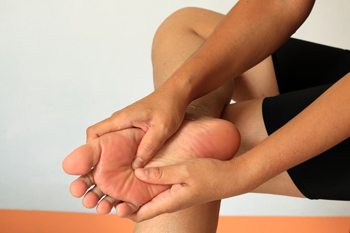 Many people with diabetes, especially those over 55 years old, develop a condition known as peripheral neuropathy. It affects nerves in the outer portion of the body, rather than in the heart and central core. A common symptom of peripheral neuropathy is a feeling of pins and needles, combined with shooting pain in the feet. You may also feel a loss of balance, lack of coordination, and muscle weakness. In addition, neuropathy may also cause sores on your feet to take a long time to heal. Diabetes is thought to be a major cause of peripheral neuropathy, the result of continual high blood sugar levels that damage the nerves. Other causes include direct injury to the nerves, a viral infection (such as shingles), a side-effect of some medications, smoking, and drinking too much alcohol. If you have diabetes or are experiencing any of the above symptoms, it is a good idea to develop an ongoing relationship with a podiatrist for a diagnosis, continued monitoring, and treatment specific to your case.
Many people with diabetes, especially those over 55 years old, develop a condition known as peripheral neuropathy. It affects nerves in the outer portion of the body, rather than in the heart and central core. A common symptom of peripheral neuropathy is a feeling of pins and needles, combined with shooting pain in the feet. You may also feel a loss of balance, lack of coordination, and muscle weakness. In addition, neuropathy may also cause sores on your feet to take a long time to heal. Diabetes is thought to be a major cause of peripheral neuropathy, the result of continual high blood sugar levels that damage the nerves. Other causes include direct injury to the nerves, a viral infection (such as shingles), a side-effect of some medications, smoking, and drinking too much alcohol. If you have diabetes or are experiencing any of the above symptoms, it is a good idea to develop an ongoing relationship with a podiatrist for a diagnosis, continued monitoring, and treatment specific to your case.
Neuropathy
Neuropathy can be a potentially serious condition, especially if it is left undiagnosed. If you have any concerns that you may be experiencing nerve loss in your feet, consult with one of our podiatrists from Active Foot and Ankle Care, LLC. Our doctors will assess your condition and provide you with quality foot and ankle treatment for neuropathy.
What Is Neuropathy?
Neuropathy is a condition that leads to damage to the nerves in the body. Peripheral neuropathy, or neuropathy that affects your peripheral nervous system, usually occurs in the feet. Neuropathy can be triggered by a number of different causes. Such causes include diabetes, infections, cancers, disorders, and toxic substances.
Symptoms of Neuropathy Include:
- Numbness
- Sensation loss
- Prickling and tingling sensations
- Throbbing, freezing, burning pains
- Muscle weakness
Those with diabetes are at serious risk due to being unable to feel an ulcer on their feet. Diabetics usually also suffer from poor blood circulation. This can lead to the wound not healing, infections occurring, and the limb may have to be amputated.
Treatment
To treat neuropathy in the foot, podiatrists will first diagnose the cause of the neuropathy. Figuring out the underlying cause of the neuropathy will allow the podiatrist to prescribe the best treatment, whether it be caused by diabetes, toxic substance exposure, infection, etc. If the nerve has not died, then it’s possible that sensation may be able to return to the foot.
Pain medication may be issued for pain. Electrical nerve stimulation can be used to stimulate nerves. If the neuropathy is caused from pressure on the nerves, then surgery may be necessary.
If you have any questions, please feel free to contact our offices located in Fair Lawn, Riverdale, and Englewood, NJ . We offer the newest diagnostic and treatment technologies for all your foot care needs.






